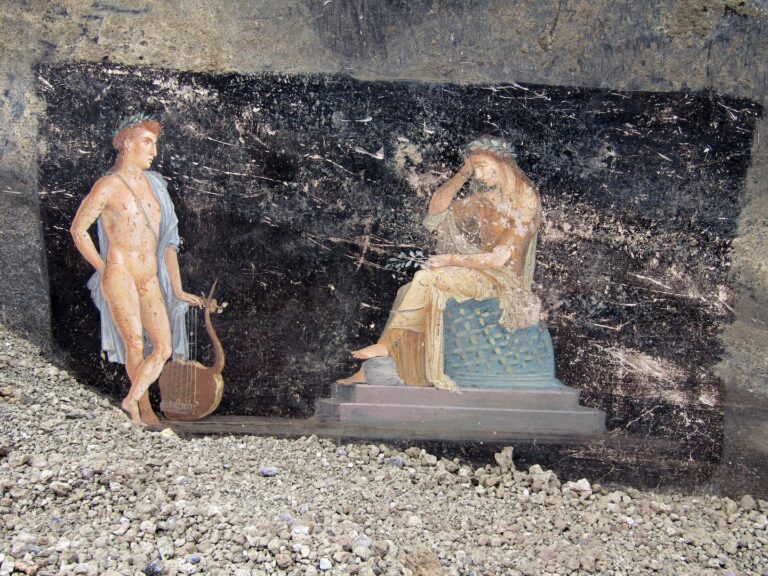
[ad_1]
The walls of the room were painted black to prevent the smoke from oil lamps being seen, explained Gabriel Zuchtriegel, the director of the Pompeii archaeological park.
“People would meet to dine after sunset; the flickering light of the lamps had the effect of making the images appear to move, especially after a few glasses of good Campanian wine,” he said in the same statement Thursday.
The room, with its frescoes and mosaics, was part of “an elegant lifestyle” of its ancient owners, according to the site.
The site at Pompeii contains more than 13,000 rooms across 1,070 residential units, the site says, in addition to public and sacred spaces. According to UNESCO, which lists it as a World Heritage site, Pompeii is “the only archaeological site in the world that provides a complete picture of an ancient Roman city.”
The paintings recently discovered included references to figures from the legendary Trojan War between the early Greeks and the people of Troy in Western Anatolia around the 12th or 13th century B.C., which is featured in ancient Greek works such as the Iliad and Homer’s Odyssey, as well as Roman literature.
The recently discovered artworks include a depiction of the Greek legendary figures Helen of Troy and Paris, the son of the Trojan king who is identified in an inscription by his Greek name, Alexandros. The images also show Cassandra, a figure from Greek mythology who could predict the future, and the god Apollo, who cursed her and left her unable to prevent the capture of Troy.
“The mythological couples provided ideas for conversations about the past and life, only seemingly of a merely romantic nature,” Zuchtriegel said.
“In reality, they refer to the relationship between the individual and fate: Cassandra who can see the future but no one believes her, Apollo who sides with the Trojans against the Greek invaders, but being a god, cannot ensure victory, Helen and Paris who, despite their politically incorrect love affair, are the cause of the war, or perhaps merely a pretext.”
Paintings of mythological figures often adorned the living and dining rooms of Roman houses, where they would entertain guests, the site said.
The uncovered room measured around 49 feet long and 20 feet wide, and opened onto a courtyard with a staircase to the first floor, the site said. Building materials were stored under arches underneath the staircase, where charcoal drawings of “two pairs of gladiators and what appears to be an enormous stylized phallus” were found.
The banquet room was discovered as part of ongoing excavation works in the Regio IX area of the site and a wider project to shore up the perimeter between excavated and unexcavated portions of the site.
It is in the same area as two interconnected houses and a house with a bakery that have already been excavated.
“Pompeii is truly a treasure chest that never ceases to surprise and amaze us because, every time we dig, we find something beautiful and significant,” Italian Culture Minister Gennaro Sangiuliano said, according to a statement.
Other recent discoveries in Pompeii include a prison bakery where enslaved workers and donkeys were held together, and a fresco that appears to show an ancient precursor to pizza.
[ad_2]